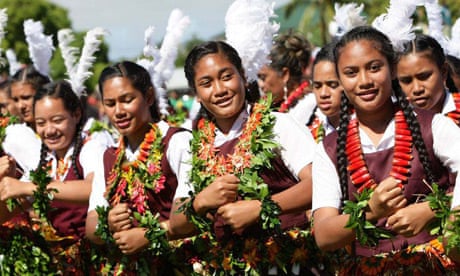Days before he is formally enthroned, the king of Tonga has announced he will relinquish the near-absolute rule his family has held over the impoverished South Pacific nation for generations.
King George Tupou V said he is "voluntarily surrendering his powers to meet the democratic aspirations of many of his people".
The 60-year-old bachelor king is to surrender his role in day to day affairs of the government, leaving them in the charge of the prime minister. However, he will keep the monarch's judicial powers, including the ability to appoint judges and to commute prison sentences.
The sweeping changes come as the island nation, which lies between New Zealand and Hawaii, begins four days of celebrations to mark the king's official coronation.
Tupou V became king in September 2006, succeeding his late father, but his coronation was postponed after rioting over political reform left eight people dead and the centre of the capital, Nuku'alofa, virtually burned to the ground.
The timing of the announcement of the devolution of the king's power, along with parliamentary reform already promised for 2010, will help to mollify pro-democracy campaigners who had threatened to embarrass Tonga during the coronation.
In announcing the changes, the lord chamberlain's office said the Oxford and Sandhurst-educated monarch sees himself as "an architect of change" in the Polynesian kingdom, a former British protectorate. While Tonga's royal heritage was integral to the country's culture and identity, people favoured a more representative and elected parliament. "The king agrees with them," the statement added.
Tonga — a 170-island archipelago with a population of about 101,000 — is one of the least developed and poorest nations in the Pacific, and its economy is dependent on pumpkin and vanilla exports, fishing, foreign aid and remittances sent from Tongans living abroad.
The cost of the coronation celebrations — up to £2m — has raised eyebrows in some quarters. The New Zealand prime minister, Helen Clark, one of the foreign dignitaries due to attend, said that the reputed £200,000 cost of the coronial robes and a gold sceptre was " more than we'd spend" but said she believed a lavish celebration was justified given that the coronation of a monarch was an important event in a nation's life.
Thousands of Tongans from outlying islands have travelled by boat to the capital for the celebrations with others flying in from abroad. Foreign dignitaries and some members of European and Asian royal families will also attend the festivities. Nuku'alofa has been festooned with flowers by "beautification committees" in honour of the event and many people are getting into the spirit of the occasion by wearing traditional dress.
The king will be formally crowned on Friday.
